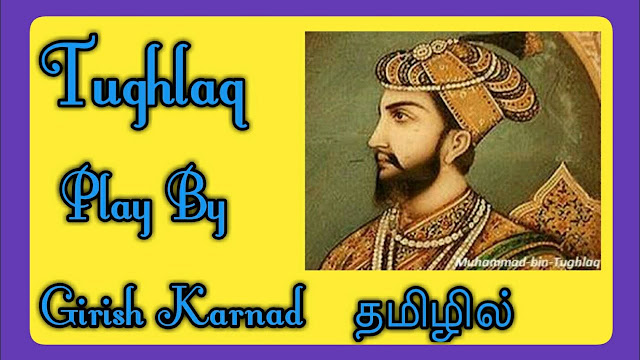Discuss the various symbols and motifs used in the play ‘Tughlaq’
WHO IS GIRISH KARNAD
Girish KarnAD is an Indian playwright, actor, director, and
writer. He was born in Matheran, Maharashtra, India in 1938. He is considered
one of the most prominent and influential figures in Indian literature and
theatre. He is known for his plays, which often deal with historical and
mythological subjects and are written in a modern idiom. Some of his most
famous plays include "Tughlaq," "Hayavadana,"
"Nagamandala," and "The Fire and the Rain."
Karnad has also worked as a director, actor, and screenwriter
in the Indian film industry. He has written screenplays and dialogues for
several critically acclaimed films, and has also acted in a number of films and
television shows. He has been honored with several awards and honors throughout
his career, including the Padma Shri, Padma Bhushan and Jnanpith Award. He has
also served as a director of the National School of Drama and as a professor at
various universities.
ALSO READ:-
Discuss the theme of communalism and its treatment in the novel ‘Tamas’
Discuss the various symbols and motifs used in the play
‘Tughlaq’
"Tughlaq" is a play written by Girish KarnAD,
Indian playwright, actor and director. The play is set in the 14th century and
is based on the life of Muhammad bin Tughlaq, a historical figure who was the
Sultan of the Delhi Sultanate in India. The play explores themes of power,
ambition, and the consequences of political and ideological extremism.
One of the main symbols in the play is the character of
Tughlaq himself. Tughlaq is a complex and contradictory figure who is both
idealistic and ruthless, intelligent and naive, and who is torn between his
desire to create a just and fair society and his lust for power. Tughlaq
represents the contradictions and complexities of human nature, and the dangers
of idealism unchecked by pragmatism.
Another important symbol in the play is the city of
Daulatabad, which is the capital of Tughlaq's empire. The city represents the
power and grandeur of the Tughlaq's rule, but also the chaos and confusion that
results from his policies.
The motif of the game of chess is also used throughout the
play to symbolize the political power play and strategy of the characters. The
chess game symbolizes the moves and countermoves of the characters, as well as
the way in which the characters manipulate and deceive one another for their
own gain.
Discuss the various symbols and motifs used in the play
‘Tughlaq’
The motif of language is also used throughout the play.
Tughlaq's attempts to impose a new language on his subjects is a symbol of his
attempt to impose his own ideology and control over the minds of the people.
In summary, the play Tughlaq, by Girish KarnAD uses various
symbols and motifs to convey its themes. The character of Tughlaq is a complex
and contradictory figure who represents the contradictions and complexities of
human nature and the dangers of idealism unchecked by pragmatism. The city of
Daulatabad represents the power and grandeur of Tughlaq's rule, but also the
chaos and confusion that results from his policies. The motif of the game of
chess symbolizes the political power play and strategy of the characters, and
the motif of language is used to symbolize Tughlaq's attempt to impose his own
ideology and control over the minds of the people.
WHAT IS THE SUMMARY OF TUGHLAQ
"Tughlaq" is a play written by Girish KarnAD,
Indian playwright, actor, and director. The play is set in the 14th century and
is based on the life of Muhammad bin Tughlaq, a historical figure who was the
Sultan of the Delhi Sultanate in India. The play explores themes of power,
ambition, and the consequences of political and ideological extremism.
The play is divided into two parts, the first of which is set
in the court of Tughlaq and deals with the political machinations of the
characters. The second part of the play is set in the city of Daulatabad, which
is the capital of Tughlaq's empire, and deals with the consequences of
Tughlaq's policies.
The play explores the life and reign of Tughlaq, who is
portrayed as a complex and contradictory figure who is both idealistic and
ruthless, intelligent and naive. Tughlaq is torn between his desire to create a
just and fair society and his lust for power. The play also explores the
consequences of Tughlaq's policies, which are characterized by chaos and
confusion.
Throughout the play, the characters are shown to be
struggling with the moral and ethical implications of Tughlaq's policies and
the role they have played in implementing them. The play also explores the idea
of the power and its corrupting influence.
Discuss the various symbols and motifs used in the play
‘Tughlaq’
In summary, Tughlaq is a play by Girish KarnAD that explores
the themes of power, ambition, and the consequences of political and
ideological extremism through the historical figure of Muhammad bin Tughlaq,
the 14th-century Sultan of the Delhi Sultanate in India. The play is divided
into two parts, the first of which is set in the court of Tughlaq and deals
with the political machinations of the characters and the second part of the
play is set in the city of Daulatabad, which is the capital of Tughlaq's empire,
and deals with the consequences of Tughlaq's policies.
ALSO READ:-
Discuss the theme of communalism and its treatment in the novel ‘Tamas’








0 comments:
Note: Only a member of this blog may post a comment.